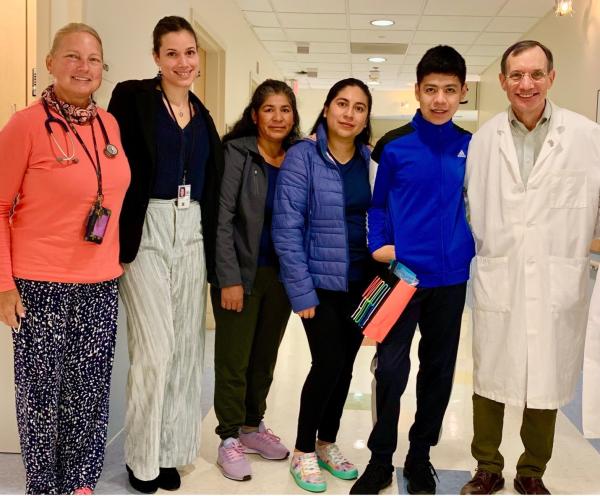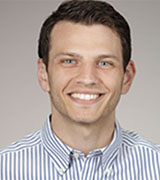A Bedside-to-Bench-to-Bedside NIH Success Story
NIAID Research Leads to FDA-Approved Drug for Rare Disease
BY PETER MANZA, NIAAA

CREDIT: NIAID
Michael Lenardo leads NIAID’s Molecular Development of the Immune System Section. His lab identified the first patient with CHAPLE disease, a severely debilitating and life-threatening genetic condition.
When Micael arrived at the NIH Clinical Center three years ago from rural Bolivia, the 15-year-old was suffering from debilitating symptoms that included severe gastrointestinal pain, nausea, vomiting, and lung infections. He was severely underweight and malnourished and feared that eating would trigger his stomach troubles.
He suffered from this condition from infancy and although doctors tried many treatments, none worked. He was one of fewer than 100 people worldwide looking for answers for CHAPLE disease, which stands for “complement hyperactivation, angiopathic thrombosis, and protein-losing enteropathy.” Fortunately, researchers at the National Institute of Allergy and Infectious Diseases (NIAID) had already been investigating how to help.
NIAID scientists had determined that patients with CHAPLE disease possess two defective copies of the CD55 gene, so their bodies cannot inhibit the complement, a part of the innate immune system. In a healthy body, complement proteins can be recruited to form a deadly attack complex on the cell membranes of bacteria and other infectious agents. But in CHAPLE disease, without CD55 inhibition, those proteins run amok and damage cells of healthy tissues, especially in the intestinal lymphatic system, and spill protein-rich blood into the gastrointestinal cavity, causing the abdominal problems and metabolic imbalance. Because they also lose antibodies contained in the blood, they are immunodeficient and get infections. By losing blood anticoagulant proteins, they also develop blood clots that can be life-threatening.
“People with this disease are in starvation mode their entire lives,” said Michael Lenardo, Chief of the Molecular Development of the Immune System Section of the NIAID Laboratory of Immune System Biology. Lenardo described how the high rate of blood clots in people with CHAPLE disease almost universally leads to early death. “At one point, the oldest patient we knew of had died at 32. Untreated, this is a horrific disease.”
Lenardo has devoted his career to investigating the molecular basis for genetic disorders such as CHAPLE. In 2006, Lenardo and Helen Su, Chief of NIAID’s Human Immunological Diseases Section, organized the NIAID Clinical Genomics Program at the Clinical Center to pool resources from more than 20 different intramural research program groups and pharmaceutical companies, including Merck and Regeneron. This effort paid dividends in 2017 when Lenardo’s team, co-led by then-Postdoctoral Fellow Ahmet Ozen, first discovered that CD55 mutations were a hallmark of CHAPLE disease (N Engl J Med 377:52-61, 2017).
The implication of this research was clear: If researchers could use a drug to support or mimic the function of CD55, it might slow the runaway complement activity and help the patients’ symptoms improve.
A monoclonal antibody that blocked complement, eculizumab, was already FDA-approved as a treatment for another genetic disease, paroxysmal nocturnal hemoglobinuria. Yet according to Lenardo, they could not come to terms with the drug’s manufacturer to test it in their research.
At about this time, Ozen had returned to his faculty position at Marmara University in Istanbul, Turkey, and was determined to find another path forward. He was able to convince the Turkish health ministry to purchase eculizumab for compassionate use therapy of CHAPLE patients. The ensuing study by Ozen and Lenardo culminated in a January 2021 publication in which the team first reported a tremendous improvement in the symptoms of 16 patients in Turkey with CHAPLE (Nat Immunol 22:128–139, 2021).
“The low protein that had been observed in these kids their entire lives had jumped back into the normal range within a week or two,” Lenardo said. The clinical team was astounded, as Lenardo describes: “When you give that first shot [of eculizumab], literally within hours, the children stop having stomach problems. Within a day or two, they go back to eating and normal activities.”
In 2019, when positive results were becoming clear, Lenardo and Ozen sought to build upon this success and develop a drug that could be approved specifically for CHAPLE disease and widely available throughout the world. In partnership with Regeneron, they initiated an international 110-week trial using Veopoz (pozelimab-bbfg), a unique complement inhibitory antibody, in 10 people with CHAPLE. Lenardo credits the unique resources and people at NIH and the Clinical Center for a crucial role.
“They have so many ways that help investigators do clinical research,” Lenardo said. “The Clinical Center and Children’s Inn were instrumental in bringing Micael from Bolivia to participate in the trial, and [he'd] spend almost the entire pandemic living on campus with his sister, who served as his legal guardian."

CREDIT: NIAID
Work by Lenardo’s lab led to a new FDA-approved drug based on a clinical trial for the treatment of CHAPLE disease. One of the participants, Micael, experienced dramatic recovery from the symptoms of this terrible disease shortly after beginning the drug. Shown left to right: Priscilla Quackenbush (the patient’s nurse practitioner), Heather Moorman, Mrs. Meri Limachi Pantoja (mother), Ms. Tatiana Limachi (sister), Micael Guzman Limachi, Dr. Michael Lenardo.
For Micael, efforts have paid off spectacularly. He is now symptom-free, enjoying a life of normal eating and activities for the first time, and he has experienced substantial growth in height and weight. The treatment has given him a new life. He says his favorite thing is that he can eat whatever he wants! In August 2023, the FDA registered Veopoz as the first approved treatment for CHAPLE disease.
Lenardo sees these successes as only the beginning. "The complement system has been implicated in all sorts of diseases, including heart disease and neurodegeneration. Having a medication that potently inhibits this pathway is likely to be very useful in other diseases in the future,” he said.
Leveraging the strong research infrastructure at NIH, Lenardo has been participating in an effort led by Daniel Reich, a Senior Investigator in the National Institute of Neurological Disorders and Stroke, and Christina Farias of the Foundation for Advanced Education in the Sciences to establish a center for biomedical innovation to accelerate treatment for disorders of the future. “They have championed the idea that we need an ecosystem to accelerate medical innovation with industry partners,” Lenardo said.
Lenardo emphasized that bringing clinical teams, scientists, and pharmaceutical experts together requires an infrastructure that supports taking discovery research from bench to bedside. “When you do that, the reward is enormous.”

Peter Manza, a research fellow at the National Institute on Alcohol Abuse and Alcoholism, is studying how chronic drug use changes brain function and how the brain recovers after people enter treatment for substance-use disorders. In his spare time, he enjoys cooking, hiking, strumming the guitar, and playing beach volleyball.
This page was last updated on Wednesday, November 1, 2023
